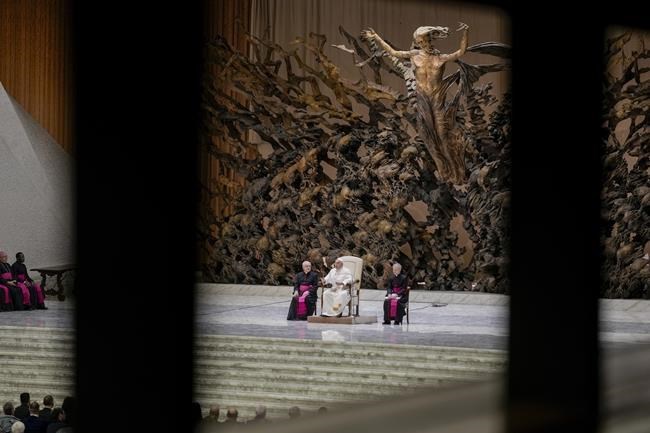TORONTO — Frank Testin was hopeful when he heard Pope Francis would allow priests to bless same-gender couples. He thought it was a small step toward LGBTQ+ acceptance in the Roman Catholic Church.
Then he read what the Vatican actually said.
"It mentions that the union LGBT people have with their partners cannot be compared in any way to a marriage. I find that really objectionable," said Testin, 73, who married his husband 13 years ago.
"It's a real blow to the stomach."
While some are indeed welcoming Monday's doctrinal declaration as a sign of progress, other Canadian Catholics see the document as cementing the church's existing position: that romantic relationships between people of the same gender are lesser than those of their heterosexual counterparts.
"It says some judgmental, stern and not very loving comments towards its LGBTQ members — church members who are or want to be in relationships," said Testin, a Toronto resident who was raised Catholic and still attends a monthly mass.
The document from the Vatican's doctrine office reaffirms the position that a marriage is between a man and a woman, but says priests can, under some circumstances, bless "couples in irregular situations" and "couples of the same sex."
The document stresses that the blessings cannot in any way resemble the sacrament of marriage: they can't use set rituals or even involve the clothing and gestures that belong in a wedding. It should be spontaneous, the document says, and should not happen during or even "in connection" with the ceremonies of a civil union.
For Testin, this is disappointing. It feels insignificant.
"It's almost like sitting down with a priest who you met on the street and you decide to have lunch with," he said. "You ask the priest to bless the food."
For 40 years Testin has been part of Dignity Canada Dignité, an organization of Catholics advocating for the Church to update its stance on sexual minorities, and he now serves as its president.
There is a gap, Testin said, between the church's positions and the lived experiences of practising and lapsed Catholics, and the Vatican should work to fill that gap.
For some, thislateststatement is evidence that the Vatican is doing just that.
"This move by the Pope, rather than pushing those people within the community to the margins of the Catholic Church, it really is an invitation to bring people in," said John Jacob, who serves as secretary for an LGBTQ-friendly ministry and is queer.
"It is certainly a significant step to meet LGBT Catholics where they are."
While it's difficult to say how big the LGBTQ+ Catholic population is, Jacob said anywhere between 50 and 100 people come to All Inclusive Ministries' monthly mass at Our Lady of Lourdes Parish in Toronto.
"It's hard to estimate what that looks like nationally, but it's not an insignificant number by any means who would be impacted by this movement by the Vatican and by the Pope," he said.
The Pope's new position comes amid a reported rise in anti-LGBTQ+ hate. In 2018, there were 186 alleged hate crimes related to sexual orientation reported to Canadian police, according to Statistics Canada. In 2022, the last year with available data, there were 491.
Jacob said he hopes people see the doctrinal declaration as an invitation.
"I would hope that the news by the Vatican, for LGBT people, is a beacon of hope insofar as they are ultimately being heard," he said. "They're being seen, they're being acknowledged, but also being communicated to by the Pope that they are in fact welcome."
This report by The Canadian Press was first published Dec. 20, 2023.
Nicole Thompson, The Canadian Press



